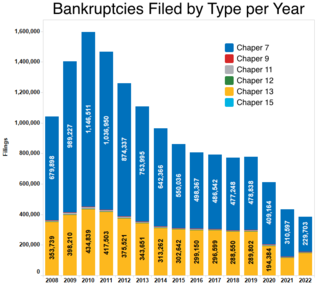Bankruptcy is a legal process through which people or other entities who cannot repay debts to creditors may seek relief from some or all of their debts. In most jurisdictions, bankruptcy is imposed by a court order, often initiated by the debtor.

A lien is a form of security interest granted over an item of property to secure the payment of a debt or performance of some other obligation. The owner of the property, who grants the lien, is referred to as the lienee and the person who has the benefit of the lien is referred to as the lienor or lien holder.
Debt restructuring is a process that allows a private or public company or a sovereign entity facing cash flow problems and financial distress to reduce and renegotiate its delinquent debts to improve or restore liquidity so that it can continue its operations.
A creditor or lender is a party that has a claim on the services of a second party. It is a person or institution to whom money is owed. The first party, in general, has provided some property or service to the second party under the assumption that the second party will return an equivalent property and service. The second party is frequently called a debtor or borrower. The first party is called the creditor, which is the lender of property, service, or money.

A debtors' prison is a prison for people who are unable to pay debt. Until the mid-19th century, debtors' prisons were a common way to deal with unpaid debt in Western Europe. Destitute people who were unable to pay a court-ordered judgment would be incarcerated in these prisons until they had worked off their debt via labour or secured outside funds to pay the balance. The product of their labour went towards both the costs of their incarceration and their accrued debt. Increasing access and lenience throughout the history of bankruptcy law have made prison terms for unaggravated indigence obsolete over most of the world.

In the United States, bankruptcy is largely governed by federal law, commonly referred to as the "Bankruptcy Code" ("Code"). The United States Constitution authorizes Congress to enact "uniform Laws on the subject of Bankruptcies throughout the United States". Congress has exercised this authority several times since 1801, including through adoption of the Bankruptcy Reform Act of 1978, as amended, codified in Title 11 of the United States Code and the Bankruptcy Abuse Prevention and Consumer Protection Act of 2005 (BAPCPA).
Hypothec, sometimes tacit hypothec, is a term used in civil law systems or mixed legal systems to refer to a registered non-possessory real security over real estate, but under some jurisdictions it may sometimes also denote security on other collaterals such as securities, intellectual property rights or corporeal movable property, either ships only as opposed to other movables covered by a different type of right (pledge) in the legal systems of some countries, or any movables in legal systems of other countries. Common law has two main equivalents to the term: mortgages and non-possessory liens.

Debt collection is the process of pursuing payments of money or other agreed-upon value owed to a creditor. The debtors may be by individuals or businesses. An organization that specializes in debt collection is known as a collection agency or debt collector. Most collection agencies operate as agents of creditors and collect debts for a fee or percentage of the total amount owed. Historically, debtors could face debt slavery, debtor's prison, or coercive collection methods. In the 21st century in many countries, legislation regulates debt collectors, and limits harassment and practices deemed unfair.
Repossession, colloquially repo, is a "self-help" type of action, mainly in the United States, in which the party having right of ownership of the property in question takes the property back from the party having right of possession without invoking court proceedings. The property may then be sold by either the financial institution or third party sellers.
Bankruptcy in the United Kingdom is divided into separate local regimes for England and Wales, for Northern Ireland, and for Scotland. There is also a UK insolvency law which applies across the United Kingdom, since bankruptcy refers only to insolvency of individuals and partnerships. Other procedures, for example administration and liquidation, apply to insolvent companies. However, the term 'bankruptcy' is often used when referring to insolvent companies in the general media.
In finance, a security interest is a legal right granted by a debtor to a creditor over the debtor's property which enables the creditor to have recourse to the property if the debtor defaults in making payment or otherwise performing the secured obligations. One of the most common examples of a security interest is a mortgage: a person borrows money from the bank to buy a house, and they grant a mortgage over the house so that if they default in repaying the loan, the bank can sell the house and apply the proceeds to the outstanding loan.

United Kingdom insolvency law regulates companies in the United Kingdom which are unable to repay their debts. While UK bankruptcy law concerns the rules for natural persons, the term insolvency is generally used for companies formed under the Companies Act 2006. Insolvency means being unable to pay debts. Since the Cork Report of 1982, the modern policy of UK insolvency law has been to attempt to rescue a company that is in difficulty, to minimise losses and fairly distribute the burdens between the community, employees, creditors and other stakeholders that result from enterprise failure. If a company cannot be saved it is liquidated, meaning that the assets are sold off to repay creditors according to their priority. The main sources of law include the Insolvency Act 1986, the Insolvency Rules 1986, the Company Directors Disqualification Act 1986, the Employment Rights Act 1996 Part XII, the EU Insolvency Regulation, and case law. Numerous other Acts, statutory instruments and cases relating to labour, banking, property and conflicts of laws also shape the subject.
Louisville Joint Stock Land Bank v. Radford, 295 U.S. 555 (1935), was a decision by the Supreme Court of the United States that ruled the Frazier–Lemke Farm Bankruptcy Act unconstitutional in violation of the Fifth Amendment. This unanimous decision was one of the Court's many rulings that overturned President Roosevelt's New Deal.
Bankruptcy in Irish Law is a legal process, supervised by the High Court whereby the assets of a personal debtor are realised and distributed amongst his or her creditors in cases where the debtor is unable or unwilling to pay his debts.
Civil procedure in South Africa is the formal rules and standards that courts follow in that country when adjudicating civil suits. The legal realm is divided broadly into substantive and procedural law. Substantive law is that law which defines the contents of rights and obligations between legal subjects; procedural law regulates how those rights and obligations are enforced. These rules govern how a lawsuit or case may be commenced, and what kind of service of process is required, along with the types of pleadings or statements of case, motions or applications, and orders allowed in civil cases, the timing and manner of depositions and discovery or disclosure, the conduct of trials, the process for judgment, various available remedies, and how the courts and clerks are to function.

Bristol & West Building Society v Ellis [1996] is an English land law case, concerning mortgage arrears, specifically the definition of "such time as the court thinks reasonable" for its suspension of possession orders under section 36 of the Administration of Justice Act 1970.
Mortgages in English law are a method of raising capital through a loan contract. Typically with a bank, the lender/mortgagee gives money to the borrower/mortgagor, who uses their property/land/home as security that they will repay the debt and any relevant interest. If the mortgagor fails to repay, then the mortgaged property which has been used as security may be subject to various mortgagee remedies allowing them to retrieve the debt. Mortgages are an important part of English land law and property law. These concern, first, the common law, statutory and regulatory rules to protect the mortgagor at the time of concluding the mortgage agreement. Second, English law defines and restricts the process for taking possession of property in the event of default. Third, it places duties on mortgagees on the price it achieves when selling property.
Insolvency in South African law refers to a status of diminished legal capacity imposed by the courts on persons who are unable to pay their debts, or whose liabilities exceed their assets. The insolvent's diminished legal capacity entails deprivation of certain of his important legal capacities and rights, in the interests of protecting other persons, primarily the general body of existing creditors, but also prospective creditors. Insolvency is also of benefit to the insolvent, in that it grants him relief in certain respects.

Cayman Islands bankruptcy law is principally codified in five statutes and statutory instruments:
Anguillan bankruptcy law regulates the position of individuals and companies who are unable to meet their financial obligations.







